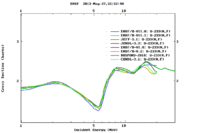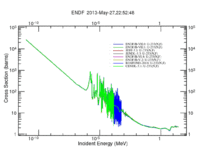Difference between revisions of "Fission fragment trasport out of U-233"
| Line 10: | Line 10: | ||
[[File:U-233_fissionxsection_fullenergyrange.gif |200px]] | [[File:U-233_fissionxsection_fullenergyrange.gif |200px]] | ||
| + | The coating on a circular metal plate which is connected to the cathode. The coating of U-233 has a cirular shape of an inch in diameter, | ||
| − | + | = | |
Revision as of 17:46, 25 August 2013
U-233 Coating
The fission chamber has a fissionale material as a sensitive neutron target. The fission chambers have usually target material that make them sensitive for neutrons, them most commonly used material for detecting thermal neutron is U-235, in case of fast neutron Th-232 or U-238 represnt good target. in some cases the fission chamber may contain more than one taget to detect a wide range of emitted neutrons.<ref name= "Andriamonje"> Novel Micromegas Detector for In-Core Nuclear Reactor Neutron Flux Measurements </ref>
In this research, the neutron sensitive material used in the fission chamber is Uranium 233. U-233 has a relatively high neutron fission cross section in the energy range of 0.1-30 MeV as shown in the figure below.
The coating on a circular metal plate which is connected to the cathode. The coating of U-233 has a cirular shape of an inch in diameter,
=
<references/>

